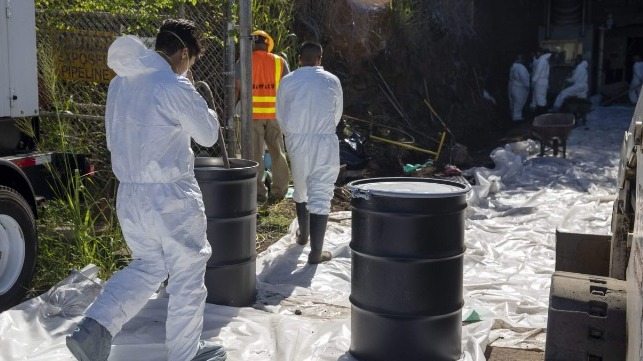U.S. Navy's Red Hill Tank Farm Spills "Forever Chemicals"

The U.S. Navy's shuttered Red Hill facility has sustained another major spill - but this time, it isn't fuel.
On Tuesday, the Navy announced an 1,100 gallon spill of concentrated AFFF near the entrance to one of Red Hill's access tunnels, and officials later increased the estimate to 1,300 gallons. A Navy contractor had been performing maintenance on the AFFF fire suppression system, and it appears that the concentrate in a storage tank leaked out of an air release valve and down into the tunnel, according to the command overseeing the facility. The details are under investigation.
Initially, Red Hill task force commander Rear Adm. John Wade told local media that there were no CCTV cameras nearby to capture the event. On Friday, the Navy reported that there were indeed two cameras nearby, and that one of them had captured footage. The service does not plan to share the video with state regulators or the public until after its contents are reviewed internally.
Cleanup efforts are under way, and the response task force plans to scrape off about one to two feet of soil outside of the tunnel entrance and dispose of it safely.
The spill has not helped to endear the Navy to local officials. Honolulu Board of Water Supply Chief Engineer Ernie Lau (a longtime critic of Red Hill) complained that the command had taken seven hours to inform his office of the AFFF release. On Friday, Lau took the unusual step of joining a public protest outside of Hawaii's State Health Department to call for accountability. "It’s time for me to come out of the box and not be a typical government official that stays in his office," he told Hawaii News Now.

that matters most
Get the latest maritime news delivered to your inbox daily.
Traditional AFFF contains per- and polyfluoroalkyl substances (PFAS), also known as "forever chemicals." These compounds build up in the human body when ingested and are not biodegradable. They are linked to multiple health effects, including heightened risk of kidney cancer, increased cholesterol levels, changes in liver function, low birth weight and suppressed immune system response. Two PFAS compounds found in old firefighting foam - PFOA and PFOS - are particularly harmful, and the EPA recommends keeping drinking water concentrations of these two substances below 0.02 parts per trillion. This vanishingly low safety threshold means big cleanup costs for heavy users of AFFF, like the U.S. military.
Though last week's spill may have increased their sense of urgency, Hawaiian officials have already made up their minds about Red Hill. The site suffered a 20,000 gallon fuel spill in 2021, which contaminated the water supply for over 90,000 military personnel and threatened to pollute an aquifer serving Honolulu's public. Earlier this year, facing intense pressure from the Hawaiian congressional delegation, the Pentagon ordered Red Hill to be permanently closed and drained. However, its fuel lines are so badly degraded that they will have to be repaired before they can be used once to remove the 100 million gallons of petroleum remaining in the site's tanks.
